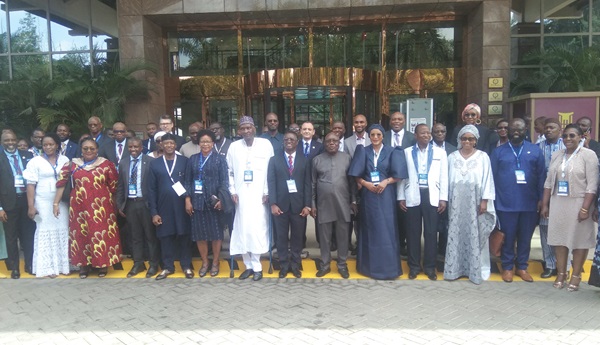Ministers responsible for environment, science and climate change from 12 West African countries have converged on Accra to explore ways to help the sub-region build resilience against global climate crisis.
The fifth Ministerial Council meeting is being held ahead of the 28th UN Framework Convention on Climate Change (UNFCCC) Conference of Parties (COP28) to strengthen inter-governmental collaboration in the sub-region and also rally other stakeholders for climate action.
The ministers would discuss ways to leverage technology and scientific research to reduce emissions, as well as promote adaptation and mitigation to climate change.
The meeting is spearheaded by the West African Science Service Centre on Climate Change and Adapted Land Use (WASCAL), in collaboration with the Federal Ministry of Education and Research of Germany.
It is being attended by ministers from Ghana, Senegal, Nigeria, Burkina Faso, Benin, Cape Verde, Cote d’Ivoire, the Gambia, Guinea, Mali, Niger and Togo.
Collective action
At the opening session in Accra yesterday, the Minister of Environment, Science, Technology and Innovation (MESTI), Dr Kwaku Afriyie, said state and non-state actors should work together to leverage scientific research, innovation and sustainable practices to reduce carbon emissions and harness the potential of green hydrogen.
He said the African continent was the hardest hit by climate change.
"Our collective effort to fight this common security threat will go a long way to win the battle against climate change.
We can only win this battle when we think globally and act regionally," the minister added.
He said the meeting could not have come at a better time, especially when the world was getting ready for CO28 in Dubai.
"As we get ready for this conference where governments will engage in multilateral discussions on how to limit and prepare for future climate change, we should be reminded as African players - both state and non-state actors, that our continent has been and is still being hit hard by climate change,” the minister said.
Commitment
Dr Afriyie said the country’s commitment to winning the battle against climate change was evidenced in the update of the nationally determined contributions (NDCs) strategy in 2022, under the Paris Agreement.
"The update covers 19 policy areas which were translated into 47 adaptation and mitigation programmes of action," the minister said.
He further said that the NDCs and climate policies by the government would foster social inclusion by focusing on youth and women to ensure greenhouse gas (GHG) emission reductions.
It could also lead to avoidance of at least 2,900 premature deaths per year from improved air quality by 2023 and create over one million decent and green jobs.
The minister commended WASCAL for its leadership in championing climate resilience in West Africa.
He described the partnership between WASCAL and Germany in providing relevant knowledge and technologies on climate change as key to combating the crisis.
Collaboration
The Chairman of WASCAL Council of Ministers, Prof. Bourema Kansaye, said given that climate change had exposed Africa to threats of food insecurity, migration and vulnerabilities, it was important for all hands to be on the deck to help deal with those challenges.
He underscored the need for civil society organisations (CSOs), research institutions, state and non-state agencies to come together and work towards tackling the menace.

